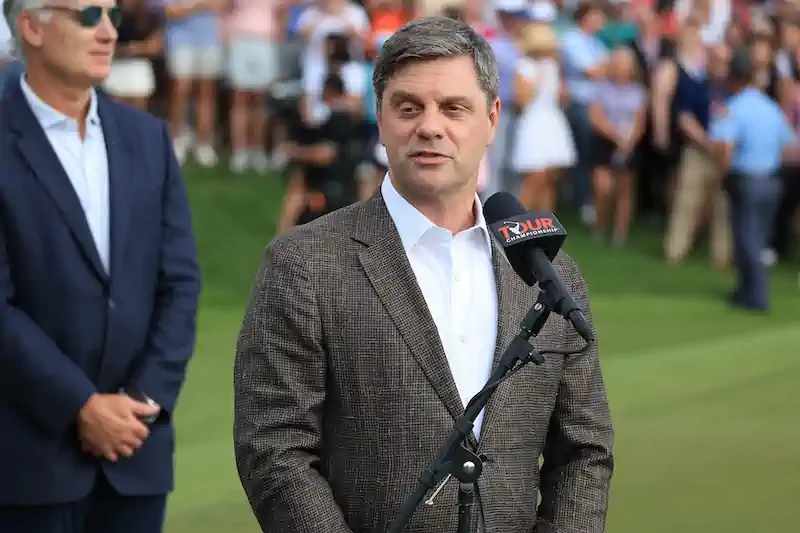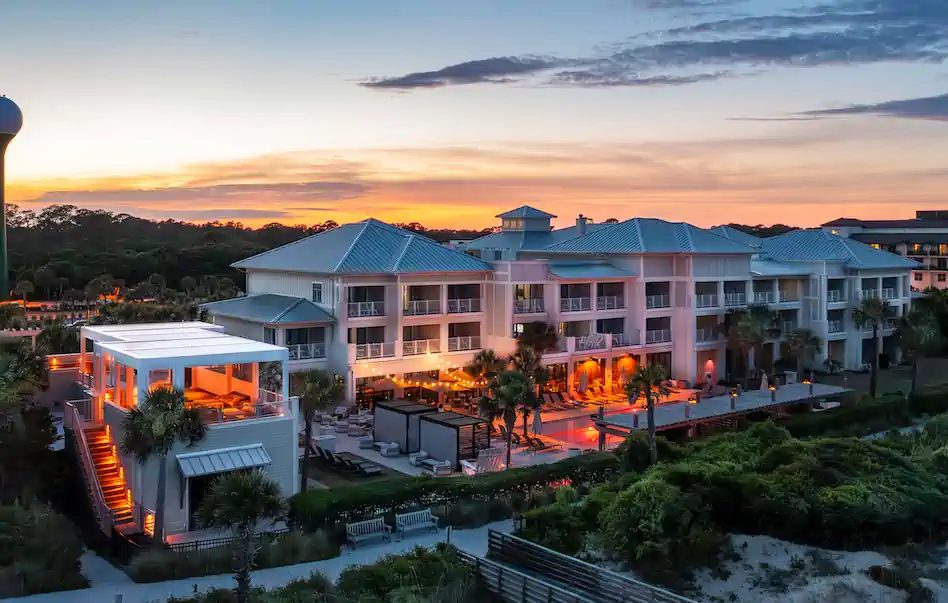The next few years will most assuredly be a transformative era for the PGA Tour.
I was seated in the third row of Brian Rolapp’s debut press conference, which took place at the Tour Championship in Atlanta last week. What first caught my attention was how Commissioner Jay Monahan eagerly handed over the baton to the sport’s first CEO, calling him “exactly the right leader for the PGA Tour right now and in its evolution.”
Even his harshest critics must honor Monahan’s tenure for ensuring the entire industry revolves around the PGA Tour. Consider how golf’s most significant events fall in the calendar: The Players Championship in March, The Masters the following month, The PGA Championship in May, June for the U.S. Open, July brings the (British) Open Championship with the FedEx Cup playoffs to follow.
And what about the Majors? All four remain a key part of the 38-event PGA TOUR schedule, despite being organized by different governing bodies.
It seems fitting to use an NFL analogy here. You could compare The Masters to the Super Bowl, the (British) Open and U.S. Opens to the NFC and AFC Championship Games, and the PGA Championship to what has become the Pro Bowl Games. The signature events would be like the Sunday Night Football game of the week, while the rest of the schedule is appointment viewing, similar to those shows televised on Thursday or Monday Nights and Sunday afternoons.
The Players has long been considered, by most, as the fifth Major, and given the quality of the field it attracts each year, along with the prize money awarded, it would be logical to rank it higher than that.
Rolapp inherits a sports business model that is gaining momentum in viewership, attendance, and sponsor commitments. Linear TV ratings and streaming consumption are increasing, as is social engagement, along with emerging digital platforms led by the recently created World Feed from the PGA Tour Studios.
With a $1.5 billion investment from modern sports barons Arthur Blank and John Henry through their Strategic Sports Group a year and a half ago, and the subsequent establishment of the for-profit PGA Tour Enterprises, Inc., led by Joe Gorder, it is no surprise that change was coming.
After three weeks on the job, Rolapp, with two decades of senior NFL leadership experience, shared the following conclusion:
“The strength of the PGA Tour is strong, but there’s much more we need to do, much more we need to change for the benefit of fans, players, and our partners,” said Rolapp, who has already met with more than 20 players, including Tiger Woods, who recently agreed to chair a “Future Competition Committee,” with three guiding principles outlined by the sport’s new chief executive; competitive parity, scarcity, and simplicity.
Every sport strives for competitive parity. Rolapp believes the Tour currently exhibits great competitive parity and balance among its players and says that is a focus while upholding another key ingredient, meritocracy. “Anyone on Tour who is a skilled golfer should have a chance to win, and we intend to prioritize that and keep it intact,” Rolapp said.
He defined scarcity as a focus on the Tour’s top players competing together more often in events that feel special for fans and themselves as members. Rolapp admitted simplicity means competition should be easy to follow. The regular season and postseason must all be connected in a way that builds towards a Tour Championship that every fan can understand.
This new committee includes six players plus Gorder, Henry, and his trusted advisor, Theo Epstein, who helped Major League Baseball introduce the pitch clock to improve the pace of play, among other notable successes.

Brian Rolapp addresses the media at the Tour Championship. (Photo credit: David Griffin)
“We’re going to honor tradition, but we will not be overly bound by it.” Rolapp added.
The PGA Tour continues to brilliantly stage weekly tournaments, making them appointment viewing for most of the year, much like the NFL’s regular season. We can thank Monahan and his predecessor, Tim Finchem, for our ability to watch golf tournaments on TV so regularly. This development allows networks to satisfy the eager appetites of viewers, helps the Tour and media partners generate tremendous advertising and partnership revenues, and ensures we at home continue to pay our monthly cable and streaming service bills.
It also leaves a scarce few weekends for third parties, such as big agencies, to step in and create made-for-TV events; think Hero World Challenge or PNC Championship, featuring PGA Tour players who are independent contractors.
Then, three years ago, came LIV Golf, which recruited some fan favorites, ran its lackluster product, but was seen as a real threat to the status quo. An arms race began to compete with their Saudi funding, prompting Monahan to launch high-dollar signature events, nine of which will be on the schedule in 2026, including the recent return of Miami at Trump Doral.
The lingering questions are: what will Rolapp do to streamline operations, grow the biggest stars, provide playing opportunities for emerging and second-tier pros, increase overall popularity, deliver value for stakeholders, justify revenue growth from all sources, and most importantly, serve on-site fans and viewers everywhere?
Despite the challenges and obstacles ahead, everyone I’ve spoken with remains very optimistic about the PGA Tour’s promising future and holds high hopes for its new leader.
Featured Photo credit Tracy Wilcox/PGA Tour.














